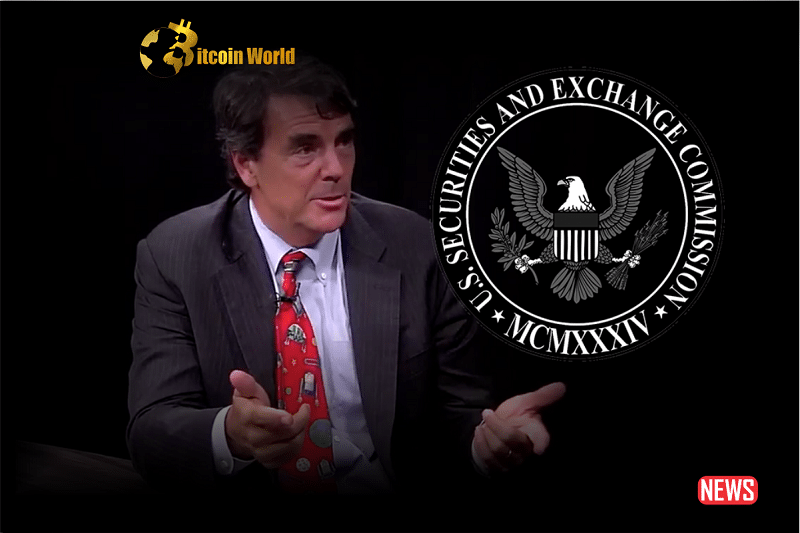Is the American dream of technological leadership at risk? Billionaire investor Tim Draper certainly thinks so, especially when it comes to the way the U.S. Securities and Exchange Commission (SEC) is handling cryptocurrency regulation. In a recent no-holds-barred interview, Draper didn’t mince words, suggesting the SEC’s current approach is not only misguided but could actually push the U.S. into a technological dark age. Let’s dive into why Draper is so concerned and what it means for the future of crypto.
Is the SEC’s Grip Too Tight on Crypto?
Draper’s core argument boils down to this: the SEC is applying old rules to a brand new game. He believes the SEC, under Chair Gary Gensler, is overreaching its authority when it comes to crypto. Think of it like trying to fit a square peg in a round hole. According to Draper, crypto isn’t a traditional security, and therefore, the SEC’s current oversight is not only unnecessary but actively harmful. He passionately argues that instead of fostering growth, the SEC’s actions are doing the opposite, potentially turning the U.S. into a “technological wasteland.” Strong words, right?
He emphasizes the incredible potential of technologies like cryptocurrencies and artificial intelligence (AI), pointing to the transformative impact they’ve already had. Consider the smartphone revolution or the groundbreaking advancements of companies like Tesla. Draper believes we need to embrace these new frontiers, not stifle them.
The Regulatory Maze: Why Crypto Companies Are Getting Lost
Everyone agrees that some level of regulation is necessary to prevent fraud and protect consumers. However, Draper argues that the current regulatory environment for crypto in the U.S. is anything but clear. It’s more like a confusing maze with no exit signs. Most crypto companies aren’t trying to skirt the law; they simply want clear guidelines to follow. The lack of this clarity is a major roadblock, pushing innovation overseas where the rules might be more defined.
Here’s the crux of the issue:
- Ambiguity Breeds Uncertainty: Without clear rules, crypto companies struggle to operate confidently.
- Innovation Goes Elsewhere: When the U.S. becomes too difficult, entrepreneurs and businesses will look to other countries.
- Progress is Hindered: Instead of focusing on building and innovating, companies are spending resources trying to navigate a complex regulatory landscape.
Draper uses the example of the SEC’s actions against companies like FTX. While acknowledging the need to address potential wrongdoing, he cautions against a broad-brush approach that indiscriminately targets the entire industry, especially without concrete evidence of fraud. He believes this kind of action sends a chilling message and stifles the very innovation the U.S. needs to stay competitive.
Coinbase in the Crosshairs: A Case Study
The situation with Coinbase, the largest cryptocurrency exchange in the United States, perfectly illustrates Draper’s concerns. Brian Armstrong, Coinbase’s CEO, has been vocal about his efforts to comply with regulations. Despite these efforts, Coinbase has faced SEC charges related to alleged securities violations. Draper sees Armstrong as someone who acted in good faith, actively seeking clarity from the SEC on how to operate legally.
Think of it this way:
| Aspect | Draper’s Perspective | SEC’s Actions |
|---|---|---|
| Coinbase’s Intent | Seeking compliance and clarity | Accused of securities violations |
| Impact on Coinbase | Potential negative impact on operations and innovation | Enforcement of existing securities laws |
| Broader Implications | Discourages other crypto businesses | Setting a precedent for crypto regulation |
Draper expresses disappointment with what he perceives as a sudden shift in the SEC’s stance, potentially harming Coinbase and other crypto businesses trying to play by the rules. He believes regulators need to carefully consider the downstream consequences of their actions, recognizing their power to either nurture or stifle innovation within the crypto industry.
The Future of Crypto in the US: A Fork in the Road?
So, where do we go from here? Tim Draper’s message is clear: the U.S. is at a critical juncture. The way regulators approach cryptocurrency will have a significant impact on the country’s future technological standing. He advocates for a balanced approach – one that provides necessary oversight to protect consumers and prevent fraud, but also encourages innovation and allows the crypto industry to flourish.
What does this balanced approach look like?
- Clear and Specific Guidelines: Crypto companies need to know the rules of the game.
- Collaboration, Not Confrontation: Regulators and industry players need to work together.
- Focus on Innovation: Policies should encourage growth and development, not hinder it.
- Risk-Based Regulation: Focus on addressing specific risks rather than a blanket approach.
Ultimately, the future of crypto innovation in the United States hinges on the decisions made by regulators. Will they adopt a more collaborative and forward-thinking approach, or will the current path continue, potentially pushing the next wave of technological breakthroughs to other parts of the world? The answer to that question remains to be seen, but voices like Tim Draper’s are certainly adding fuel to the debate.
Draper’s warning serves as a wake-up call. The SEC’s approach to crypto regulation is not just an industry issue; it’s a question of America’s technological leadership in the 21st century. Finding the right balance between oversight and encouragement is crucial to unlocking the transformative potential of cryptocurrencies and ensuring the U.S. remains at the forefront of innovation.
Disclaimer: The information provided is not trading advice, Bitcoinworld.co.in holds no liability for any investments made based on the information provided on this page. We strongly recommend independent research and/or consultation with a qualified professional before making any investment decisions.


